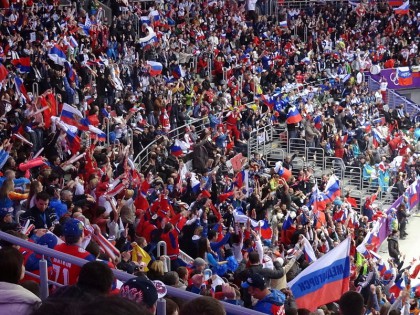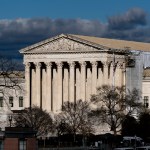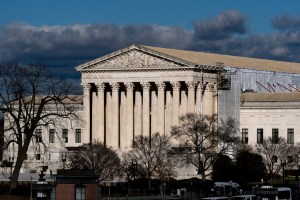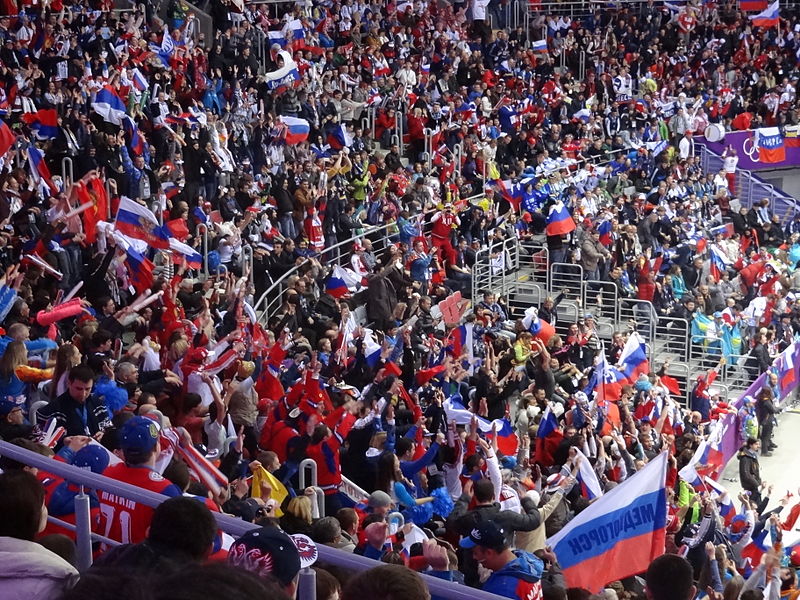
It is no secret, or surprise, that the 2014 Winter Olympic Games in Sochi, Russia would be a prime target for a terror attack, but with the culmination of long-buried rancor and generations-old bitterness coupled with the symbolism of a bloody anniversary, counterterrorism experts, academics and the former head of the House Homeland Security Committee say that threat is even greater.
The Caucasus region where the Games are being held has historically been a hotbed of war and rebellion. A known terrorist leader in the area has urged rebels to “do their utmost to derail” the Games and others have threatened to give Russia a “present” at the festivities, according to published reports. Russian President Vladimir Putin reportedly dispatched the military far in advance of the games in an effort to quell dissent throughout the region and has deployed 100,000 security personnel, police and operatives in and around the coastal city, along with constructing his now-infamous “Ring of Steel”—a lengthy and well-guarded perimeter of fencing, surveillance cameras and military warships anchored in the adjacent Black Sea—to thwart such an attack from happening.
Media outlets around the world have been warning of the possibility of such a strike for weeks, and despite all of Putin’s precautions there have been widespread fears that up to three “black widows”—the wives of slain terrorists-turned-suicide bombers—had slipped into the Games.
Many Americans received both a history and a geography lesson on April 15, 2013, when two Chechen brothers allegedly detonated two pressure cooker bombs near the finish line of the Boston Marathon, killing three, maiming and injuring hundreds and striking terror into the hearts of countless others.

The bombing occurred on Patriot’s Day, and many rightly suspected the date’s selection significant in the terrorists’ motivations. According to Jim Feldkamp, former FBI special agent specializing in counterintelligence and counterterrorism, former naval commander and current professor of politics and terrorism at George Mason University, terrorists thrive on the symbolism of anniversaries—and on Feb. 23, 2014, the very date of the Olympics’ closing ceremony, there are several significant anniversaries which give counterterrorism experts and their ilk pause.
“Terrorists love symbols,” Feldkamp tells the Press, which is why, he warns, the closing ceremony of the Olympics in Sochi is so ripe for a devastating act of terror.
“One of things that a lot of people do know, but most people don’t,” he continues, “is that the closing ceremony on the 23rd of February is Patriot’s Day for the Russians, which used to be Soviet Day for when they established the Soviet Army on February 23, 1918.” But most significantly, he explains, “on that day is the 70th anniversary of this operation called Lentil.”
According to the history books, Operation Lentil was ordered by Soviet dictator Joseph Stalin on Feb. 23, 1944 and included the forced relocation of more than 500,000 Chechens loaded into cattle cars bound for Siberia in retaliation for alleged cooperation with the Nazis in World War II. Thousands (possibly hundreds of thousands) perished in the harsh conditions of the transfer—mostly children, the elderly, and the sick. Of those who survived, more than 200,000 reportedly perished within several months at their new destination.
The ethnic cleansing also entailed massacres—one of which reportedly involving more than 700 people incinerated alive in a barn—and was classified as an act of genocide by the European Parliament in 2004.
Lincoln Mitchell, political consultant and faculty member of Columbia University’s School of International Affairs and author of Uncertain Democracy: US Foreign Policy and Georgia’s Rose Revolution and The Color Revolutions, explains the real objective of attacks tied to historical dates: recognition. Again, after all, many Americans were ignorant to the bloody past and ongoing strife between Russian, Chechnya and Caucasia (the region between the Black and Caspian seas) before the Boston Marathon Bombing.
“Terrorism is largely based on drawing attention to injustices on which the rest of the world isn’t focusing rather than damaging a target,” he tells the Press. “So, in that regard, you blow something up and then you draw attention to the plight of the Chechens, you’ve accomplished something. In its own twisted way, there’s logic to that.”
Of a possible terrorist act on February 23rd at the Olympics, he says, “Would it surprise me? No, it wouldn’t.”
Mitchell believes, however, that Russian credibility has already been irreparably damaged by the press coverage of Sochi so far—the inoperable toilets, urine-colored drinking water, half-constructed hotel rooms housing Olympians, etc.
“If, as a terrorist, your goal was to damage Russia and Putin, you could do little more damage than they’ve already done in the last two weeks, where they’ve run a corrupt and bad Olympics and the entire world virtually has ganged up and pointed this out in a way that hasn’t been done in the past,” he says. The corruption in Sochi centers on its $50 billion price tag, the most expensive in Olympics history (the previous winter Olympics in Vancouver only cost $7 billion), much of which has not been accounted for and is the subject of speculation of organized crime, bribery and racketeering, charge published reports.
The parody Twitter account @Sochiproblems, for example, identifies everything from hotel issues to plumbing problems and has served as an unprecedented amount of bad press for an Olympic host.
Mitchell also asks us to consider another scenario:
“Imagine if there was an Olympics that, through a corrupt process, landed in the most reactionary part of a country,” he says. “In that part of the country where anti-gay legislation was part of the law and they still practiced bigamy? What would the international press do? The answer is, nothing, because that’s what happened in Utah [a bribery scandal that plagued the 2002 Winter Olympics’ bidding process], and no one cared.”
Yet, agree experts, smearing egg on Russia’s face about dilapidated bathrooms and corrupt, ugly politics might not satisfy the bloodlust of nations who’ve experienced such enormous loss—especially when confronted with both the proximity to Sochi and the heavy symbolic weight of such an anniversary.
“The Russians are doing as good a job as they possibly can,” explains Feldkamp, “but what you got to remember too is that one of the hardest parts about building Sochi is the corruption that’s been going on. And so you have very corrupt construction personnel, and who knows who’s been bribing them? And they know that they’ve had this Sochi thing going on for four years. So who’s deep undercover, as we would say, just waiting for the opportunity to strike while the iron’s hot? And that last closing ceremony on the 23rd is just almost too good to pass up.”
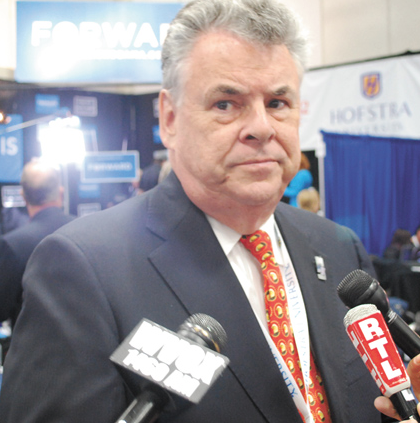
Rep. Peter King (R-Seaford), former chairman of the House Committee on Homeland Security, says the biggest concern is the breakdown in communication between Russian security and the United States.
“We’re very concerned about terror attacks at the Olympics,” King tells the Press. “Every conceivable angle is being looked at, including any type of anniversary, or rationale for them to carry out an attack. It’s a very target-rich environment. But one of the problems is the Soviets are not cooperating very much with us, unlike the Chinese or the British. There’s a grave concern. So unless you are an athlete or a family member, I would not advise you to go at all.”
The question for potential terrorists remains, say experts: Would an attack be worth the potential retribution?
“That’s the question,” says Mitchell. “For every terrorist. You want to spend the rest of your life living in a cave? What does that accomplish? The terrorist model doesn’t work very well. And anyone who thinks it does is living in a fantasy world. But some people are nuts. And when you attach them with an appealing political cause that gets nationalist juices flowing, it’s a powerful combination.
“The smarter people I talk to in the Balkan states have said for months that Putin’s going to be on his best behavior,” he continues. “So anybody who commits an act of terrorism as an effort to and that results in embarrassing Russia and its leadership at this moment where, I might argue, they’ve embarrassed themselves, is going to have the wrath of Putin and the Russian state come down upon them—after the rest of the world stops paying attention.
“So, the Olympics in Sochi will end, A-Rod will get unsuspended, Justin Bieber will get arrested for smoking crack, and 200,000 Chechens will be killed,” adds Mitchell. “And no one’s going to know. Or care.”



